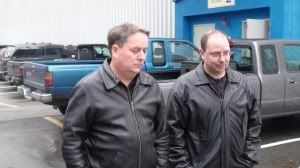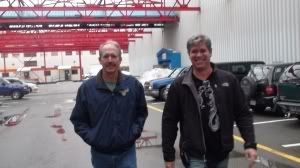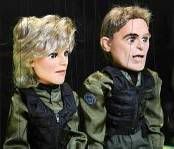(Please follow the link for the complete blog update. NEW photos at the site, including a photo of the "Stage 4" sign where the Destiny will be docked.)

John Scalzi
January 14, 2009: Scalzi and Stargate, Together At Last
Back in 2006, I read a novel that totally blew me away and single-handedly revived my passion for literary SF: Old Man’s War by author John Scalzi. It was smart, humorous, and unbelievably entertaining. So entertaining, in fact, that I ended up recommending it to anyone and everyone - friends, fans, and family alike. And their responses were equally enthusiastic. I picked up the second and third book in the series, The Ghost Brigades and The Last Colony, and enjoyed them so much that I made another Scalzi novel, The Android’s Dream, a Book of the Month Club selection on this very blog (for this stragglers who’d yet to discover the man). And today, it gives me great pleasure to (finally) welcome John Scalzi to the Stargate: Universe production as its new Creative Consultant.

Brad Wright and John Scalzi
Now what, you may ask, does a Creative Consultant do? Well, allow me to inform, clarify, and put some rumors to rest…
1. Does a Creative Consultant provide commentary on scripts in development?
Yes, the Creative Consultant reads outlines and scripts, helping to creatively shape a future episode by providing insightful input along the lines of “The color of alien plant life is dependent upon things like atmospheric chemistry, and the proximity and brightness of the star the planet happens to be orbiting!” or “Uh, James can’t be the one who saves Young. You killed her off back in episode three.”
2. Does a Creative Consultant write scripts?
It’s theoretically possible, yes. If he’s got the time, a good idea, and the inclination - why the hell not? So long as it’s understood that I’ve already called dibs on any potential future storylines involving smart-aleck robots, telepathic dogs (the beauty is that, from a visual effects standpoint, their lips never have to move), or ending with the audience realization that the episode they just watched was actually a story being read to Jelly (the ship’s telepathic canine mascot) by Anne D. Roid (the Destiny’s sassy robot caretaker).
3. If a Creative Consultant has a problem with the script, is he/she allowed to physically punish the writer?
Alas, gone are the days when studio executives could march into the production offices unannounced and kick a writer for such transgressions as contrived plotting, wooden dialogue, or liberal use of the Canadian spelling of color (“colour“). Today, as unfair as it sounds, you must have a pretty good reason to kick a writer. A weak third act break or the shoddy job he did waxing your car just won‘t cut it anymore. State labor laws and the inroads made by the WGA in recent years have all but eliminated the physical abuse of writers, except under the following circumstances:
Writer misses a script deadline = A warning for the first offense and pinky twist for the second offense (note: while the bestowing of extreme discomfort or the eliciting of plaintive cries and tears is permissible, fractures and dislocation are not. Note: Sprains are a bit of grey area open to debate.).
Writer’s script is short = Unlike a long script which can be sent back for editing, any work the writer does to a short script will amount to either the padding out of existing material or the addition of superfluous scenes. On such occasions, it is permissible for the producer to administer one paper cut to any area of the writer’s body (excluding the eye and genital area. Note: This particular clause being an annoying antiquated holdover from the old Geneva Convention.) for every page the writer is short (assuming the average page count).
Writer fails to bring back everyone’s lunch order in a timely manner = Another area open to debate: What constitutes “a timely manner”? Well, a recent agreement between the WGA and the AMPTP defines “a timely manner” as: “An interval of time up to general grumbling but not to exceed the moment at which a producer must trek to the kitchen in search of a handful of nuts to tide him over”. In this instant, it IS permissible to strike the writer BUT ONLY WITH AN OPEN FIST (closed-fist strikes are reserved for actual screw-ups with the lunch orders - ie. A failure to ensure there is, in fact, mayo on your burger.).
Writer produces a script that necessitates a full rewrite on the part of the producer = Punishable by one kick, a head butt, or two swirlies to take place at a mutually agreed upon toilet. (On the bright side, should the rewrite succeed, the fact that the writer’s name remains on the finished product will undoubtedly win him/her the accolades of many a fan who simply don’t know any better.).

Writer/Producer Carl Binder and Art Director/Production Designer James Robbins
4. Does the Creative Consultant get an office and a parking space?
Since Creative Consultants tend to be involved in a more infrequent manner, contributing whenever a script or outline is delivered as opposed to being a part of a production’s day-to-day operations, they are generally not afforded the luxury of their own office. Nor are they given their own parking space although, on occasions they do visit the offices, their on-screen credit ensures they must submit to only the most minimal of cavity searches prior to gaining admittance to the lot.
5. How much does a Creative Consultant get paid?
Numerous factors come into play here: background, experience, size of the production, workload. These factors are carefully weighed and, after some discussion, both the production and Creative Consultant agree on a reasonable rate - to be paid in World of Warcraft currency (note: John, please check the fine print in your contract).
Hope that answers some of your questions.
Anyway, John came by the production offices yesterday. We sat all sat around and discussed the show and the Air three-parter, took a stroll down to Stages 4 and 5 to tour the in-progress Universe sets, discussed John’s involvement in the production and, finally, moved on to the most important part of his visit: Dinner at Fuel.
... Finally - I was walking by the kitchen yesterday and ran into actor Mike Dopud who played Colonel Chernovshev in SG-1’s Full Alert, Odai Ventrell in SG-1’s Bounty, and Kiryk in Atlantis’s Tracker (see last season, editor). He was in the office, awaiting a copy of Tracker, so I seized the opportunity to invite him to do a fan Q&A on this blog (ie. “Hey, Mike, I’m not sure if you’re aware but the terms of your contract require you to do an online question and answer session on a blog of the producer’s choosing…”). Anyway, Mike contacted me this morning to tell me he’d be happy to swing by. So, if you’ve got questions for this former pro athlete turned stuntman turned talented actor, start posting.
~~**~~**
Stargate: Universe, starring Robert Carlyle, is set to premiere this summer on the SciFi Channel (US).
Joseph Mallozzi's blog
GateWorld's Stargate: Universe section
John Scalzi:
Web site
Blog
Books (at Amazon.com)
John Scalzi Books







No comments:
Post a Comment